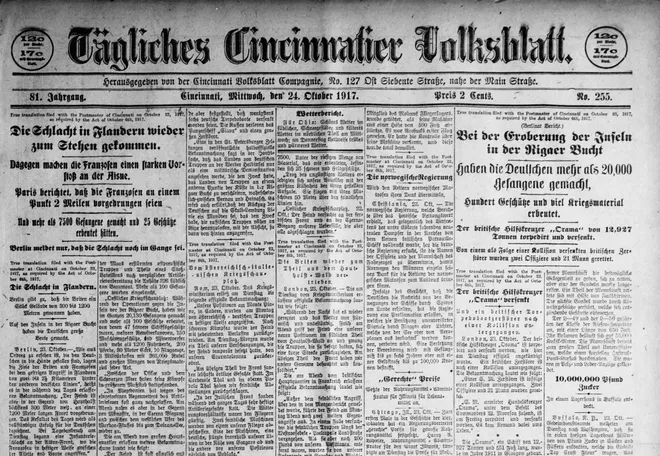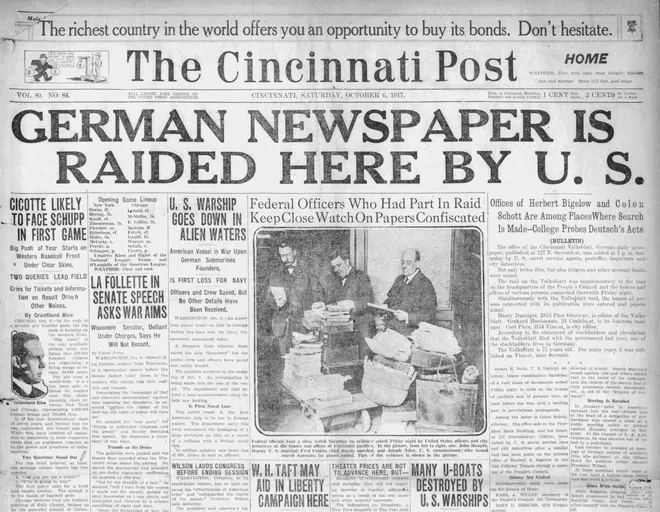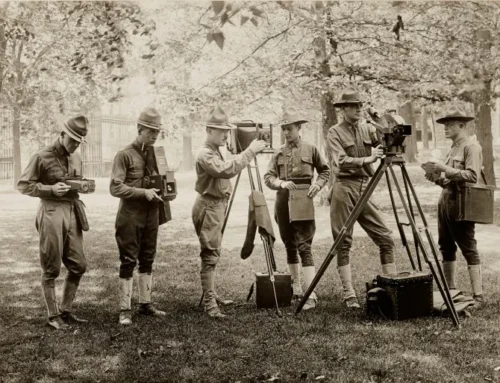This came six months after the United States declared war on Germany, finally entering the global conflict that had been raging in Europe for three years.
By the time the U.S. joined the Allies in
World War I, most Americans had already chosen their allegiance to that side. Yet, German Americans, including the editors of German-language newspapers, were vocal in their support of their homeland.
“American editors, if sympathetic to the Allies, still did not identify themselves with Great Britain or France; German-American editors regarded each German victory as a victory somehow for German-Americans,” German scholar George C. Schoolfield wrote in the article “The Great Cincinnati Novel.”
But pro-German rhetoric in 1917 was viewed as possible treason.
German-language newspapers targeted for suppression
Anti-German sentiment was rampant in cities like Cincinnati with a large German population. German language classes were dropped from city schools. The public library banished its German books to the basement.
The same day as the Volksblatt raid, President Woodrow Wilson signed the
Trading with the Enemy Act, which restricted all trade with America’s enemies – at this time, Germany and Austria-Hungary – during times of war.
The act also gave the postmaster general almost unlimited powers in suppressing treasonous publications.
Particularly targeted were foreign-language newspapers, which were accused of spreading German propaganda. The law required the newspapers to submit English translations of all articles or editorials that mentioned in any way the U.S. government or its allies in connection with the war.

The German-language newspaper Cincinnati Volksblatt (Tagliches Cincinnatier Volksblatt) for Oct. 24, 1917, has printed in English a note: “True translation filed with the Postmaster of Cincinnati on October 23, 1917 as required by the Act of October 6th, 1917.” Cincinnati Volksblatt
The Cincinnati Post, sounding none too sympathetic, ran the headline, “Ach! German Editors Must Der Work Do Twice These Days.”
German-language newspapers could apply for a federal license as an exemption to the new law if they could show proof of giving support to America and the president. Licenses were granted for the Cincinnati Freie Presse and Abend-Presse within a couple of weeks, but not the Volksblatt.
Coerced to show proof of loyalty
The passing of the Trading with the Enemy Act emboldened critics of the pro-German crowd. Coercion to conform and profess loyalty was framed as patriotism.
That Saturday afternoon in October, U.S. Secret Service agents, post office inspectors and city detectives coordinated a simultaneous raid of the Volksblatt offices at 127 E. Seventh St. and the homes of editors Henry Danziger, Gerhard Huelsemann and Carl Pletz.
The night before, a raiding party led by the district attorney and chief deputy U.S. marshal barged into a meeting of the People’s Council for Peace and Democracy, a socialist organization that opposed war against Germany, held at the Odd Fellows’ Temple at Seventh and Elm streets.
Federal agents also served warrants at the homes and private offices of pro-German supporters, including attorney Colon Schott and Herbert S. Bigelow, a pacifist agitator and pastor of the People’s Church.
The confiscated papers from the raids were scrutinized by translators. “If evidence of sedition or treason on the part of any person is disclosed it is probable arrests will be made,” The Enquirer reported.
Read the entire article on the Cincinnati Enquirer website here:
External Web Site Notice: This page contains information directly presented from an external source. The terms and conditions of this page may not be the same as those of this website. Click here to read the full disclaimer notice for external web sites. Thank you.





